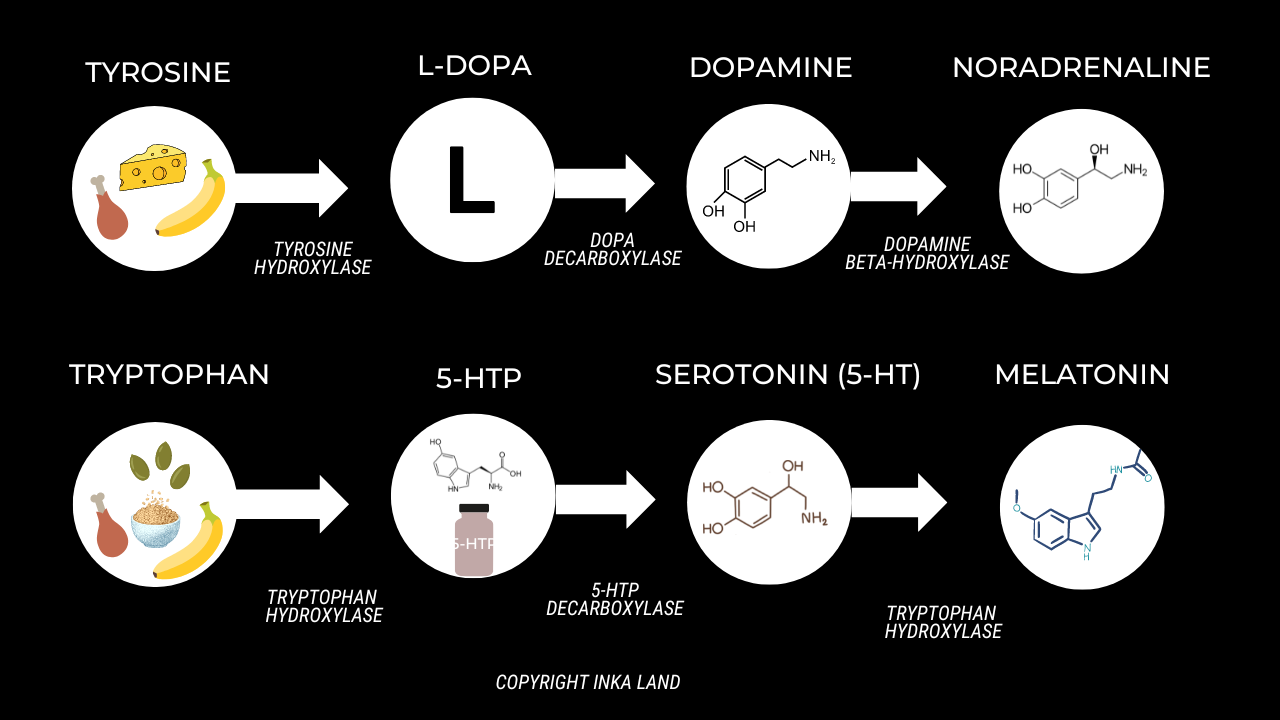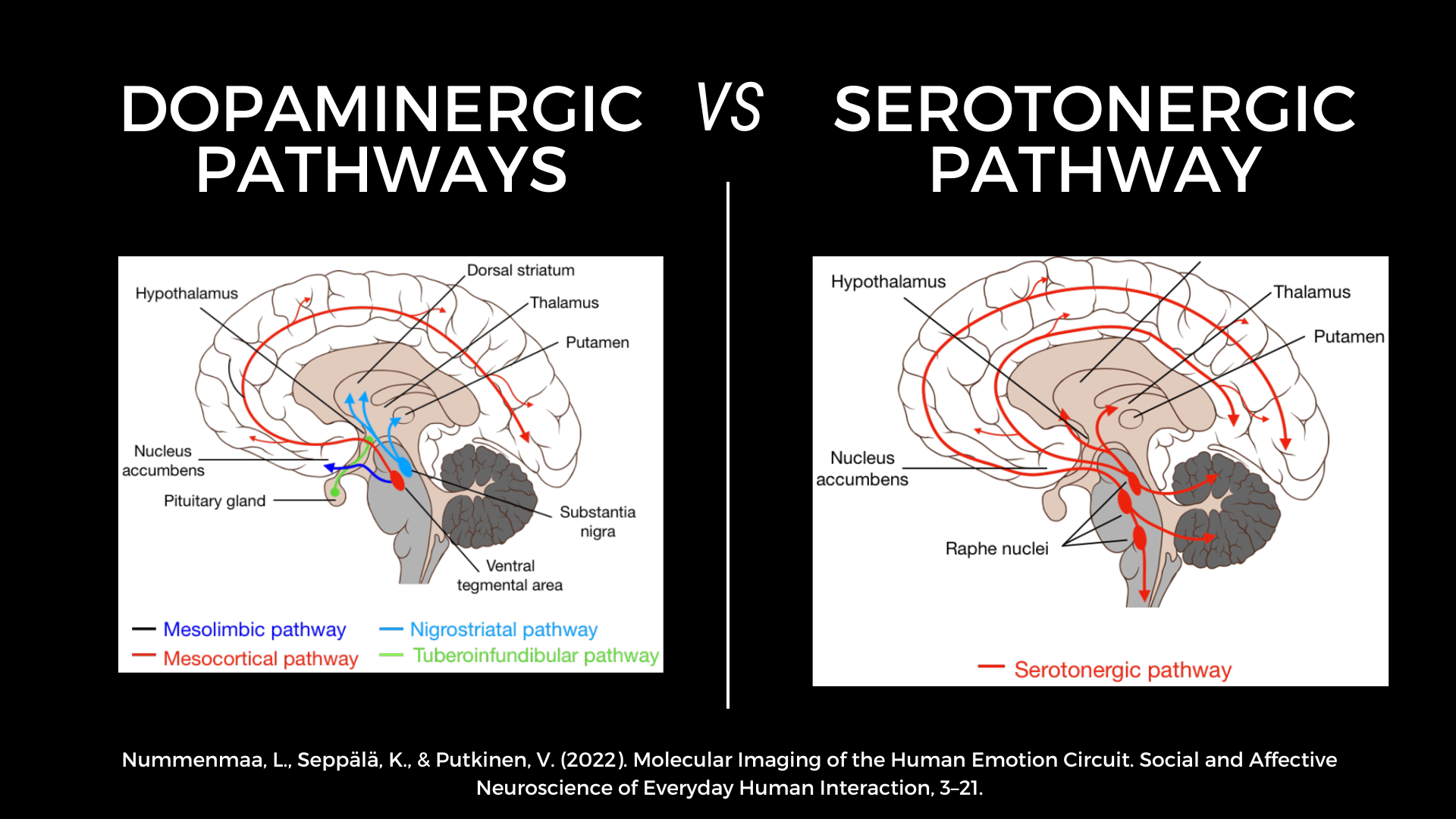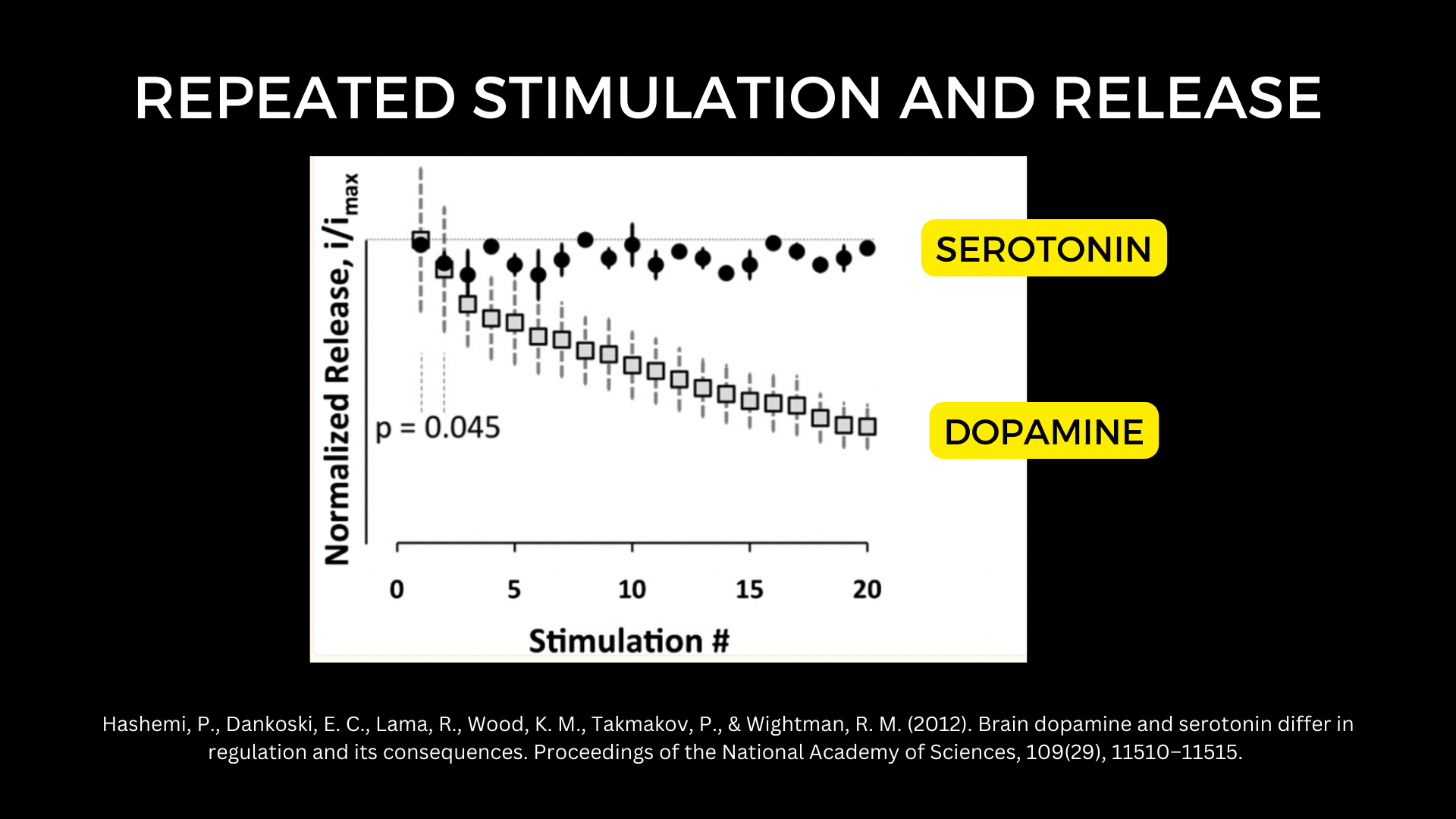Dopamine vs Serotonin: Know The Difference
Jan 30, 2023
Dopamine and serotonin are neurotransmitters and neuromodulators produced in the brain and gut. They affect cognition, mood, and behavior but are very different neurochemicals. In this article, I review their key differences.
- See the Instagram post
- Watch the YouTube video
Structure
Dopamine and serotonin are monoamine neurotransmitters but subdivided into different neurotransmitter classes based on their precursors. Dopamine is a catecholamine, which means its precursors are phenylalanine and tyrosine. Serotonin is an indole amine made from tryptophan. Both amino acids are found in foods like meats, bananas, and oats.

Derivatives
Dopamine and serotonin are converted into different molecules in the brain. Some dopamine is converted into stress hormones noradrenaline and adrenaline, which increase sympathetic tone and alertness.
Serotonin is converted into melatonin, a hormone that supports sleep, circadian rhythm, and immunity.
Dopamine vs serotonin psychology
They have different roles in mental health, mood, and behavior.
Dopamine is linked to behavioral activation; it modulates motivation and increases alertness and attention. It associates a rewarding feeling with behaviors and makes you either approach or avoid situations in the future based on past experiences. Dopamine also initiates and directs motor behaviors and movements.
Serotonin is linked to behavioral inhibition and calmness. It’s associated with feelings of contentment, general well-being, and happiness. This is not to be confused with sedation. In fact, serotonin supports daytime energy levels and wakefulness meanwhile reducing stress. Serotonin levels are also important for evening melatonin production and sleep initiation.
Impact on social behavior
Both neurotransmitters are important for social behavior. But whereas dopamine is linked to motivation and the desire to approach or avoid social situations, serotonin is more associated with general cooperation, benevolence, and agreeableness.
Impact on memory and learning
Both neurotransmitters are also central in forming memories and learning new material, but for different stages of memory.
Dopamine is more involved in the first stage of learning: paying attention to the material, staying focused, and processing material in the working memory (prefrontal cortex).
Serotonin is more involved in the second stage, which happens during rest: memory consolidation. The brain’s “memory center,” the hippocampus, is rich in serotonergic receptors and projections. It helps to transfer short-term memories from the prefrontal cortex to the cortex, which acts as long-term storage.
Loss of both types of receptors is known to cause disturbances in memory.
Low dopamine vs serotonin
The symptoms associated with low dopamine and serotonin are different.
Low dopamine levels are linked to lower activities, loss of interest, apatheia, loss of motivation and focus, reduced movement, and even loss of verbal fluency and speech. Disorders linked to low dopamine include Parkinson’s Disease, which causes disordered motor behavior, dementia, and in some cases, depression. ADHD is also characterized by low dopamine, which reduces the ability to focus and pay attention.
Low serotonin is linked to loss of happiness, contentment, and calmness. A drop in serotonin is associated with feeling nervous, irritable, angry, and even hostile. It may reduce sleep quality and daytime wakefulness, and energy levels. Conditions associated with low serotonin are post-traumatic stress, panic disorders, anxiety disorders, and OCD. Low serotonin is also linked to digestive issues and memory issues.
High dopamine vs serotonin
As dopamine is characteristically a neurotransmitter that increases motivation, alertness, and reward processing, too high dopamine levels can also lead to impulsivity and addictive behaviors. It’s associated with binge eating, gambling, and risk-taking. Frequent high spikes in dopamine can cause rapid mood and energy fluctuations. Too high dopamine can also lead to stress due to complex interactions with stress-related hormones and the reward system in the brain.
Too high serotonin levels are rare. Serotonin affects many organ systems and physiological processes, including heart rate, temperature regulation, and digestion. High serotonin levels increase nervousness, nausea, sweating, and heart palpitations, and in extreme cases, can lead to serotonin syndrome.
Dopaminergic pathways vs serotonergic system

Dopamine and serotonin networks originate from the brainstem but project to slightly different areas in the brain.
The four main dopaminergic pathways control movement, attention, executive functions, and hormones.
- Mesolimbic dopaminergic pathway
- Mesocortical dopaminergic pathway
- Nigrostriatal dopaminergic pathway
- Tuberoinfundibular dopaminergic pathway
The serotonergic system is pretty widely distributed all around the cortex.
The networks partially overlap and affect each other. For example, several of the serotonergic receptors are also expressed throughout the Dopaminergic mesolimbic and mesocortical systems and can either enhance or inhibit the rapid release of dopamine. The neurotransmitters are also called neuromodulators because they modulate the function of each other’s functions and the release of other neurotransmitters.
Speed of production
Both neurotransmitters have a so-called tonic release in the brain, which means a slow and steady release for general brain functions.
But in principle, serotonin is more stable than dopamine which can also be released rapidly in high amounts.
When certain brain areas linked to reward processing are stimulated, dopamine levels can rise 300 times more than serotonin despite the similar tissue content of the neurotransmitters.

However, dopamine also ”fatigues” faster. When the neurons are repeatedly stimulated, dopaminergic neurons fail to maintain high dopamine production, whereas serotonergic neurons can keep producing serotonin longer, although in lower amounts.
Conclusion
In conclusion, dopamine and serotonin are important for mood, memory, energy, and social behaviors. Dopamine is central to alertness, working memory, motivation, and movement, whereas serotonin is associated with happiness, contentment, calmness, and sleep. They have different precursors (tyrosine vs tryptophan), but you can get both in protein-rich foods and bananas. They also have different derivates. Dopamine makes stress-related norepinephrine, and serotonin makes sleep-related melatonin. They work in different networks that partially overlap and modulate each other. Both are released in lower amounts for maintaining basic cognitive functions, but dopamine can also spike up fast and get fatigued after repeated stimulation.
References
https://pubmed.ncbi.nlm.nih.gov/29939538/
https://pubmed.ncbi.nlm.nih.gov/33484616/
https://www.ncbi.nlm.nih.gov/pmc/articles/PMC3032992/
https://www.ncbi.nlm.nih.gov/pmc/articles/PMC4449495/
https://pubmed.ncbi.nlm.nih.gov/21459634/
https://www.ncbi.nlm.nih.gov/pmc/articles/PMC3817523/
https://www.ncbi.nlm.nih.gov/pmc/articles/PMC2170853/
https://pubmed.ncbi.nlm.nih.gov/18772052/
https://www.ncbi.nlm.nih.gov/pmc/articles/PMC4684895/
https://www.ncbi.nlm.nih.gov/pmc/articles/PMC3756112/
https://pubmed.ncbi.nlm.nih.gov/9828984/
https://pubmed.ncbi.nlm.nih.gov/29909048/
https://pubmed.ncbi.nlm.nih.gov/31905114/
https://www.sciencedaily.com/releases/2015/07/150707213245.htm
https://link.springer.com/chapter/10.1007/978-3-031-08651-9_1
https://pubmed.ncbi.nlm.nih.gov/20953589/
Stay connected with news and updates!
Join the mailing list by filling your information and I'll get back to you
We hate SPAM. We will never sell your information, for any reason.
